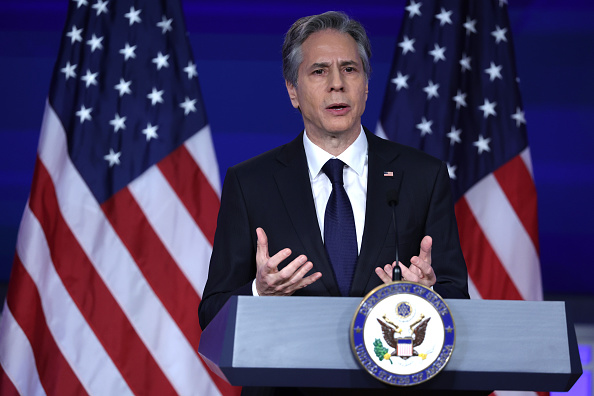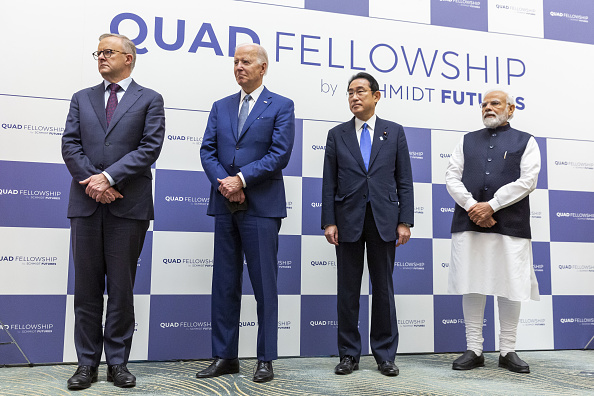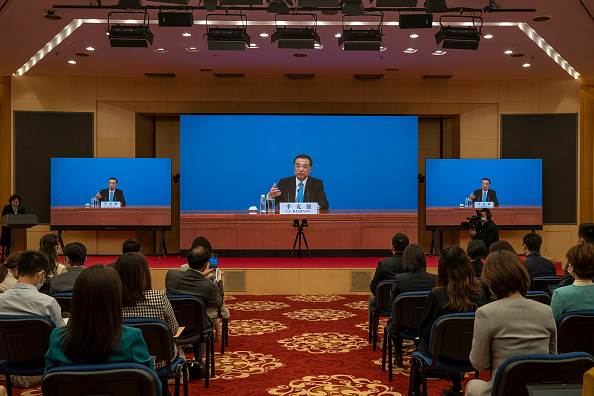
 Competing Visions
Competing VisionsSecretary of State Antony Blinken delivered a much anticipated speech on the Biden Administration's China policy, saying that the U.S. will rally the global alliance supporting Ukraine's defensive war against Russia to confront China, calling it a "charged moment for the world."
"Beijing's defense of President Putin's war to erase Ukraine's sovereignty and secure its sphere of influence in Europe should raise alarm bells for all of us who call the Indo-Pacific Region home," Blinken said at George Washington University.
Describing Beijing as the "most serious long-term challenge to the international order," Blinken's speech served as a clear articulation of President Biden's strategy to confront China, which the president has described as the greatest challenge facing the U.S. in the 21st century.
Blinken said that China is seeking to dominate the industries of the future and outlined the U.S. response will be to bolster investment at home; work closely with allies, particularly in the Indo-Pacific region; and compete with China on a "level playing field." He said Xi's government is actively undercutting the international system that aided China's own rise.
The U.S. strategy, Mr. Blinken said, could be described "in three words: invest, align, compete."
Blinken also noted that the U.S. respects China's "achievements and history, their culture, and deeply value the ties of family and friendship that connect us. And we sincerely wish for our governments to work together on issues that matter."
In response Chinese media called the speech just "a summary of old clichés to show the Biden administration's assertiveness to outcompete China while enhancing the campaign to stigmatize Beijing despite a seemingly softer rhetoric." Chinese Foreign Ministry spokesman Wang Wenbin called the speech "eloquent and painstaking" and accused it of "spreading false information."
 A Further Decoupling
A Further DecouplingDuring his first trip to Asia as president, President Biden signaled a more confrontational approach to China on multiple fronts, issuing a sharp warning against any potential attack on Taiwan. The message of the trip was that America is back as a global leader, and intends to play a huge role in the Indo-Pacific.
On the trip, Biden said the United States would defend Taiwan militarily if it came under attack by China and that deterring Beijing from aggression in Taiwan and elsewhere was among the reasons it was critical to punish Russian President Vladimir Putin for his "barbarism in Ukraine."
Biden added: "We agree with the 'One China' policy ... but the idea that it can be taken by force, just taken by force, is just not appropriate. It would dislocate the entire region and be another action similar to what happened in Ukraine. And so it's a burden that's even stronger."
During the trip Biden formally launched his much-anticipated economic pact, the Indo-Pacific Economic Framework with a dozen other Indo-Pacific countries, which is key to America's efforts to counter China's clout in Asia in the economic sphere by partnering with other countries.
Chinese officials called the proposed agreement a "covert political weapon intended to splinter Beijing from its neighbors" and Chinese state media accused the U.S. of "key to U.S. President Joe Biden's efforts to counter China's clout in Asia in the economic sphere by partnering with other countries."
Read more in "Behind Biden's Asia Trip," by Zhao Minghao, a Senior Fellow at the Charhar Institute.
 A Critical Point
A Critical PointBeijing held a nationwide emergency meeting among China's top leaders earlier this week in efforts to urge new measures to stabilize the economy after months of tough Covid-19 protocols. Over 100,000 representatives from across provincial, city, and council levels, along with high-ranking Chinese officials, attended the video teleconference held by China's cabinet.
At the meeting, Chinese Premier Li Keqiang called on local governments to help stabilize the economy, which he said was at risk of contracting during the second quarter. The state-run Global Times reported that Li said the economic impact seen in March and April has surpassed that of 2020 during the initial coronavirus outbreak in some aspects, and that the economy is at a "critical point" for determining its full-year trajectory. Li cited several indicators for the economic downturn, including unemployment rates, lower industrial production, and cargo transportation, along with unforeseen factors such as continued Covid-19 outbreaks and the war in Ukraine.
While the premier has become increasingly vocal about the recent economic challenges, even calling them "grim," he also emphasized that his chief goal is to ensure that the economy expands in the second quarter.
Li also spoke of the need to stabilize foreign trade and further open up China to international markets after recent surveys by foreign business groups that suggested a declining confidence of business and investment in the world's second-largest economy.
"The 8.1 percent growth of China's economy last year was largely driven by foreign trade," Li said, according to a transcript of his speech. "This year, we are met with sharply worsening difficulties amid changing climates, but we must recognize that 70 per cent of our manufacturing relies on imported parts, and that foreign trade generates direct and indirect jobs for 180 million people."
Read more in "How Geopolitical Conflict, Sanctions, and Covid in China Are Redefining The Future of Global Supply Chains," by Earl Carr, Founder and Chief Executive Officer at CJPA Global Advisors, and James Hinote, a Geopolitical Analyst at CJPA Global Advisors.
Prepared by China-US Focus editorial teams in Hong Kong and New York, this weekly newsletter offers you snap shots of latest trends and developments emerging from China every week, while adding a dose of historical perspective.
- 2022-05-20 Common Ground
- 2022-05-13 Bilateral Interests
- 2022-05-06 Vying for Mutual Benefit
- 2022-04-29 Seeking Relief
- 2022-04-22 Tipping Point
- 2022-04-15 “Persistence is Victory”
- 2022-04-08 No Divorce
- 2022-04-01 Auditing Accountability
- 2022-03-25 Playing Policy
- 2022-03-18 One Hand Cannot Clap
- 2022-03-11 Political Forecast
- 2022-03-04 Competitive Advantage
- 2022-02-25 A Sovereign Tightrope
- 2022-02-18 Strategic Disengagement
- 2022-02-11 In the Thick of It
- 2022-02-04 Year of the Tiger
- 2022-01-28 Zero-Sum
- 2022-01-21 An Uncertain Future
- 2022-01-14 Digital Advances
- 2022-01-07 The Dawn of a New Political Year
